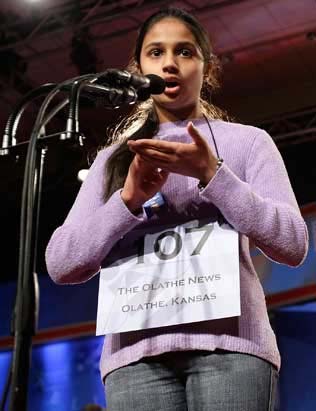Dec 25, 2025
Dec 25, 2025
Indian American children have been on a “hot spell” recently. Seven of the last eleven winners in the prestigious Scripps National Spelling Bee contests belonged to this ethnic minority. This year alone fourteen of the forty-one semi finalists (33%) were Indian American children. So much so the Times of India boasted that there was an “air of inevitability” among Indian immigrants when it came to winning the National Spelling Bee. The elite Indian American children as a group is now compared to the Canadian hockey players, Jewish violinists, Chinese acrobats and Kenyan long distance runners.

Kavya Shivashankar winner of 2009 Spelling Bee Contest
America has taken notice. A few years ago comedian Jon Stewart from the Daily Show quipped, "We’ll help India build nuclear reactors if their children stop crushing us in Spelling Bees.” Then he jokingly attributed the prowess of Indian American children for winning spelling bee contests to their unusually long tongue-twister names. Does a boy named Sivaramabalamuralikrishnan Aghilandanayagaswami Iyenggar have an undue advantage in spelling some of the most bizarre words of the English language?
For Americans the Scripps National Spelling Bee contest has become a primetime pastime. ESPN broadcasts it like a sporting event. The spellbinding show has undoubtedly cast a spell on Americans (pun intended). They like seeing young boys and girls fidgeting nervously, attempting to spell abstruse words. We come to know the personalities of the children so well that we pride ourselves as if they are our own. Most of the words are peculiar and weird, hardly ever used in the vocabulary. Many of the words are lifted directly from medical textbooks (sacrococcygeous, for example). The television audiences do not feel intimidated by the spelling because the broadcasters cleverly display the words on the screen.
The competition where their children excel has given the parents an opportunity to live vicariously. Their own pedantic realms revolved around rote learning and they push the children to perform better academically at ever-younger ages. So we have seen fourteen-year old Indian Americans finishing medical school and twelve-year olds attending college. There is a disproportionate number of Indian American children who stand out in the spelling bee contests as well. Their penchant for competitiveness might have started very early in life. After all we have all heard mothers boasting how her two year old was potty-trained months before other children. The spirit of competition starts early in life!
There is a curious story of a young Indian boy who had gone to his friend’s house for a sleepover one weekend. Early in the morning he was seen intently studying a thick book - the family edition of Random House dictionary. When questioned the boy said, “This has many different words! I only own the Oxford Dictionary”.
Do these children have specially developed brains or are their successes fruits of hard labor? Perhaps it is both. It also could be the culture in which their ancestors were raised. Tunku Varadarajanj (WSJ) theorizes that there may be an atavistic stream flowing through Indian children's’ veins. After all, their ancestors memorized Vedas and mantras. They repeated them verbatim for many millennia before they were written down.
Perhaps the power of recollection is etched firmly in their genes (the geek gene?). But sheer memory is insufficient to win such a competition. No human brain can memorize 450,000 words (unless they are blessed by Mnemosyne, the Greek goddess of memory). Superior intellect and smartness may be products of some luck and a lot of hard work, as Malcolm Gladwell suggests in his book Outliers. Gladwell has coined the phrase “Ten Thousand Hour Rule.” In order to achieve greatness in any field one must at least spend ten thousand hours at the task. I don’t know if the contestants spent ten thousand hours studying the intricacies of the English language but they certainly have shined in their fields. We cannot also dispute the fact that hard work and a dull brain will not fetch the same result.
Meanwhile, the rest of us, who fall outside Gladwell’s ten-thousand-hour ‘hard worker bee’ rule, can depend on spell-check (as I have done repeatedly while writing this article). We don’t need to learn to spell words any more, not even ordinary words. Our computer comes to the rescue. However, the spell-check program has its limitations too. Regardless of the meaning they convey or glaring syntax errors, legitimate English words are accepted. Here is an example from a poem from an unknown author:
I have a spelling checker
It came with my pea sea
It plainly marks four my revue
mix steaks eye kin knot sea
Eye have run this poem threw it,
I am shore your pleased to no
Its letter perfect awl the way
My checker told me sew!
With that as my queue, eye, Neria Harish Hebbar wood now like to sine of!
12-Sep-2009
More by : Dr. Neria H. Hebbar